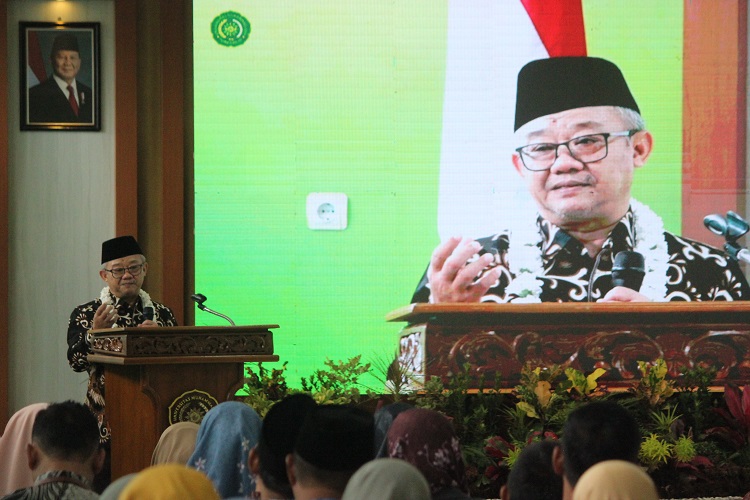
Universitas Muhammadiyah Purworejo (UMPWR) - through the Elementary School Teacher Education (PGSD) Study Program organised the 2025 National Seminar on Basic Education with the theme "Deep Learning Approach to Elementary School Learning in the 21st Century Era". This seminar was held on Thursday, 22 May 2025 in the Seminar Room of Campus III Sucen UMPWR. The seminar was held in a blended manner, where presenters and invited guests attended offline, while participants were online.
The seminar was attended by University leaders, Deputy Regent of Purworejo, Plt. Head of the Purworejo Regency Education and Culture Office, Chairman of the Muhammadiyah Purworejo Regional Leadership, Chairman of the 'Aisyiyah Purworejo Regional Leadership, and Muhammadiyah school principals in Purworejo. The speakers at this seminar were three speakers who are competent in the field of education, namely the Indonesian Minister of Primary and Secondary Education (Mendikdasmen RI), Prof. Abdul Mu'ti, M.Ed., Prof. Suyanto, M.Ed., Ph.D. from Yogyakarta State University, and Prof. Dr. Siska Desy Fatmaryanti, M.Si., from Muhammadiyah Purworejo University.
In his remarks, UMPWR Rector Assoc. Prof. Dr Teguh Wibowo, M.Pd., welcomed and thanked the speakers, invited guests, presenters, and participants who had attended. The Rector explained that this Seminar is a good opportunity to discuss and examine more deeply about the deep learning approach in elementary school learning, and how we can implement it effectively in the 21st century era. The Rector said that this seminar succeeded in gathering 176 internal participants, and 26 external participants as well as 115 internal presenters and 5 external presenters, so that the total consisted of 322 participants and presenters who attended online and offline.
Prof. Dr. Abdul Mu'ti, M.Ed (Menteri Pendidikan Dasar dan Menengah) bersama Wakil Bupati Purworejo, BPH, Rektor UMPWR berfoto bersama pada acara Semnas Pendidikan Dasar 2025 PGSD UMPWR (22/05/2025)
Deputy Regent of Purworejo Dion Agasi Setiabudi S.I.Kom M.Si, said that currently many jobs are taken over by technology, and one of the solutions presented by the Indonesian Ministry of Education and Culture is through a deep learning approach.
Therefore, said the deputy regent, the need for innovation from educators, so that the learning process is not just memorising. ‘Learning is not only memorising but with full awareness, and with applications or applications in daily life,’ he explained. The Deputy Regent explained that the future of today's children depends on the educators, and the Government of Purworejo Regency fully supports the programmes of the Ministry of Education and Culture of the Republic of Indonesia, including this deep learning approach.
"I never imagined when I was a child, that there would be a time when we no longer needed to go to the library to do something. But we can already use the GPT chat," he said.
Therefore, said the deputy regent, the need for innovation from educators, so that the learning process is not just memorising. ‘Learning is not only memorising but with full awareness, and with applications or applications in everyday life,’ he explained. The Deputy Regent explained that the future of today's children depends on the educators, and the Government of Purworejo Regency fully supports the programmes of the Ministry of Education and Culture of the Republic of Indonesia, including this deep learning approach.
Prof. Dr Abdul Mu'ti, M.Ed (Minister of Primary and Secondary Education), on this occasion delivered material on the Urgency of Deep Learning in Basic Education: Answering the Challenges of the 21st Century. The Minister said that teaching must inspire, not just dictate or cram students with theories. The inspiration can be from oneself or from others obtained by educators to be channelled to their students. Mendikdasmen explained that the learning method is more important than the material. Therefore, he gave tips so that students do not easily cheat, namely by making questions whose answers are not completely wrong, but the questions must be able to require students to think deeply. Furthermore, the government, in this case Kemendikdasmen, will continue to develop this deep learning approach without foreign debt.
Furthermore, the seminar was filled by Prof. Suyanto, M.Ed., Ph.D (Yogyakarta State University) who delivered the topic of Designing Deep Learning-Based Learning in Elementary Schools, and Prof. Dr. Siska Desy Fatmaryanti, M.Si (Muhammadiyah Purworejo University) with the topic of Technology Utilisation to Support Deep Learning in Elementary Classrooms. The seminar is also expected to be a forum for sharing knowledge, experiences, and innovative ideas in improving the quality of basic education in Indonesia. (akb/KP)